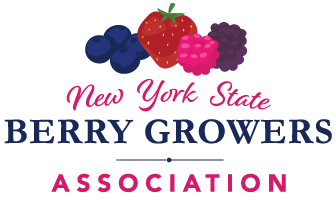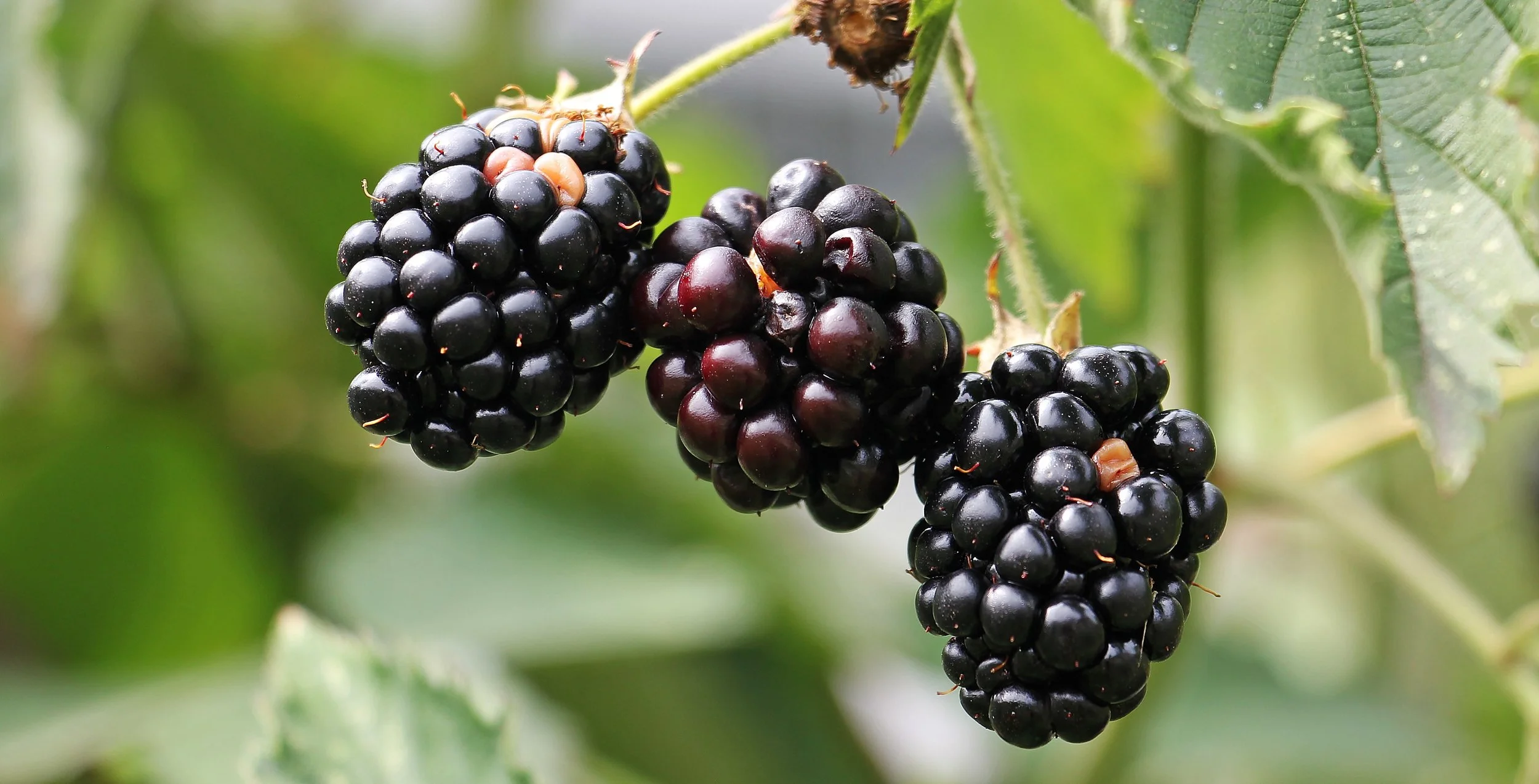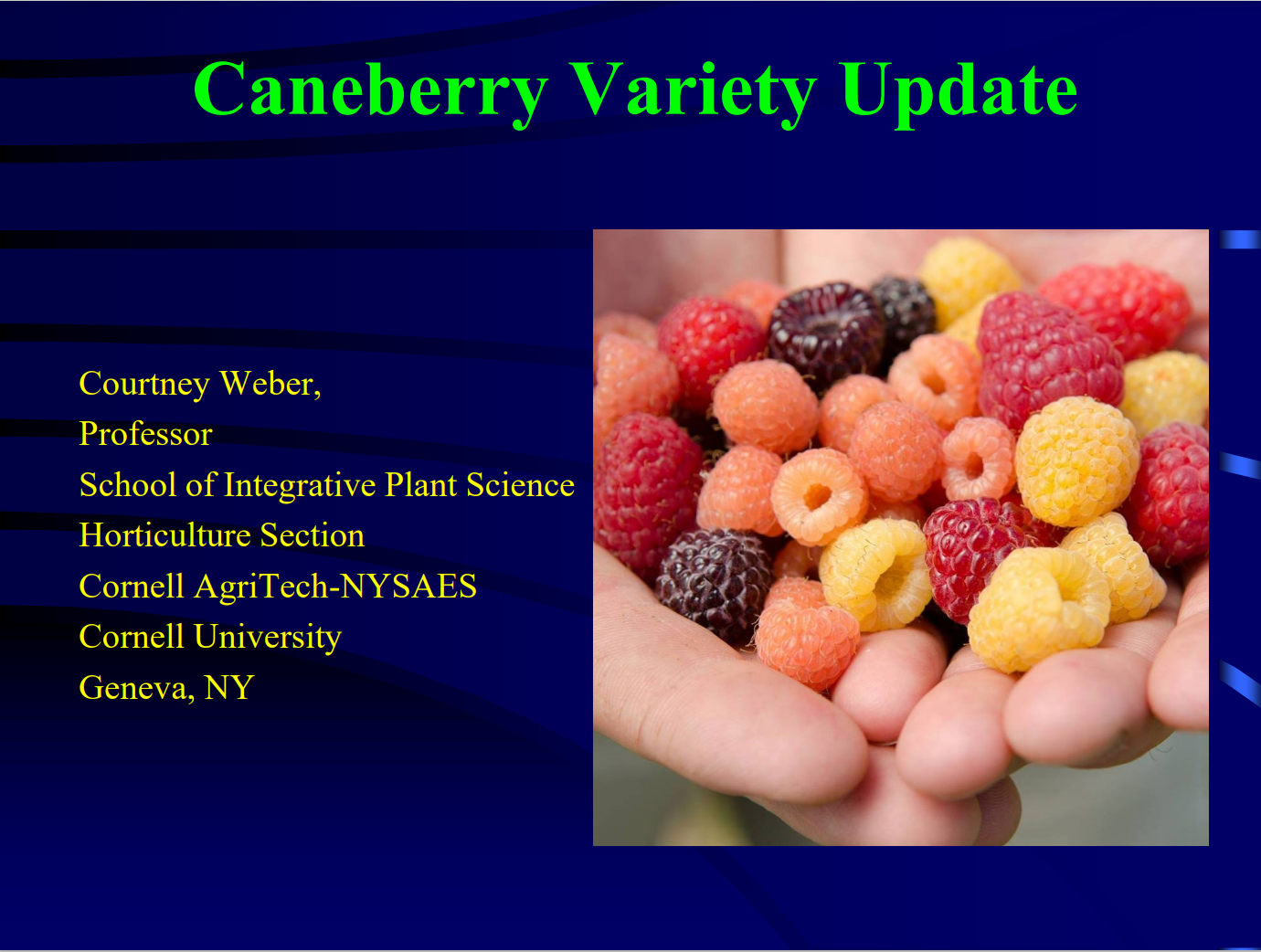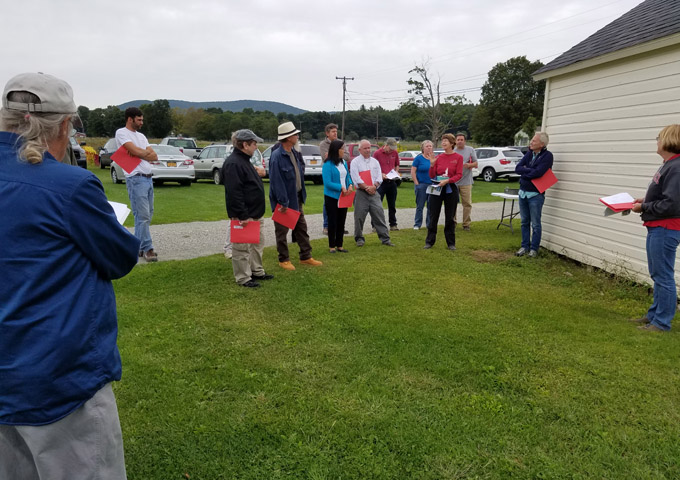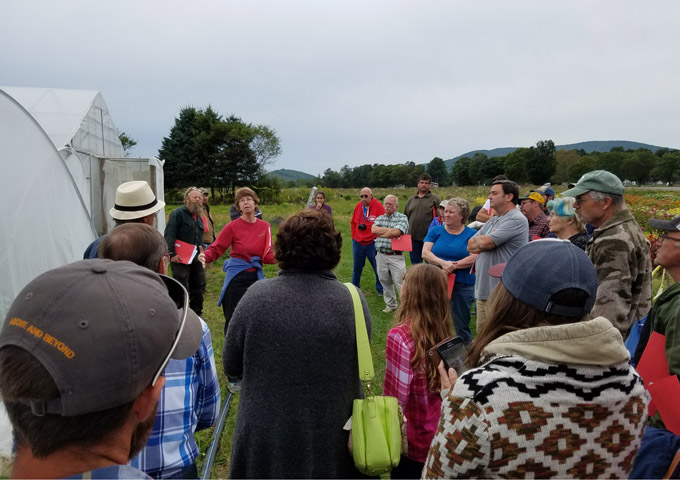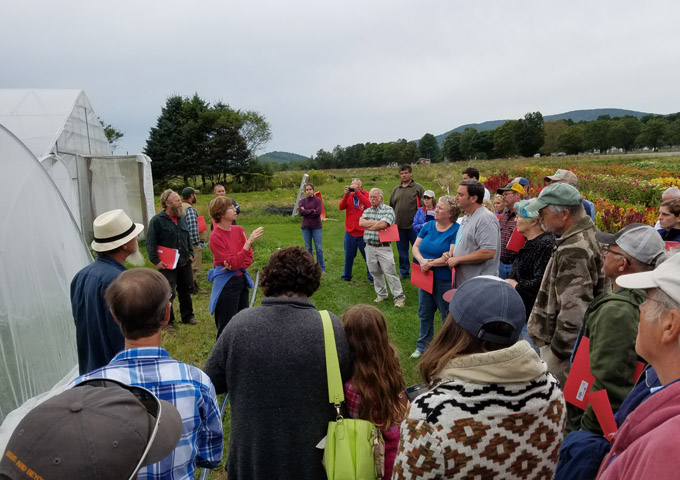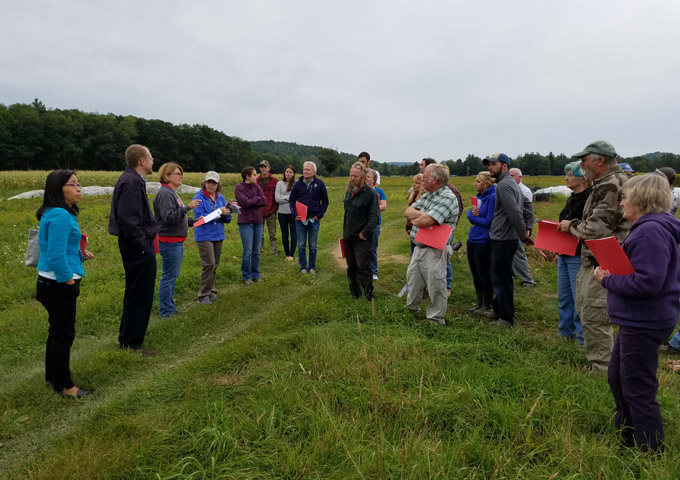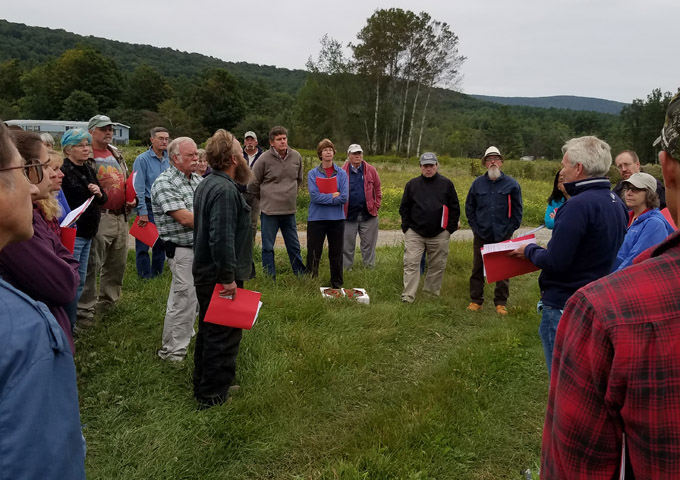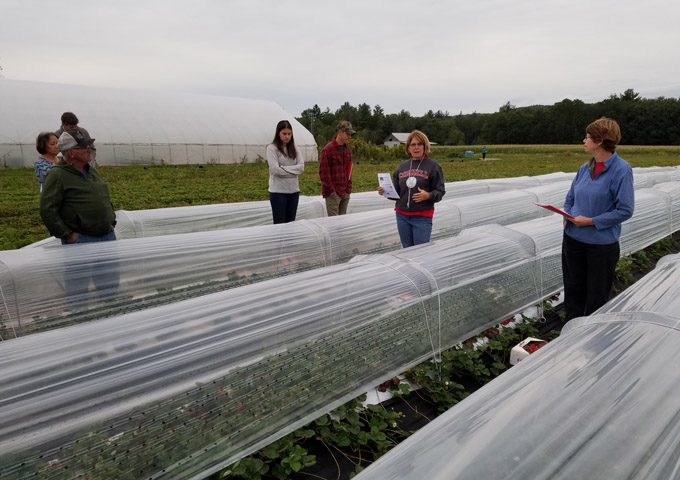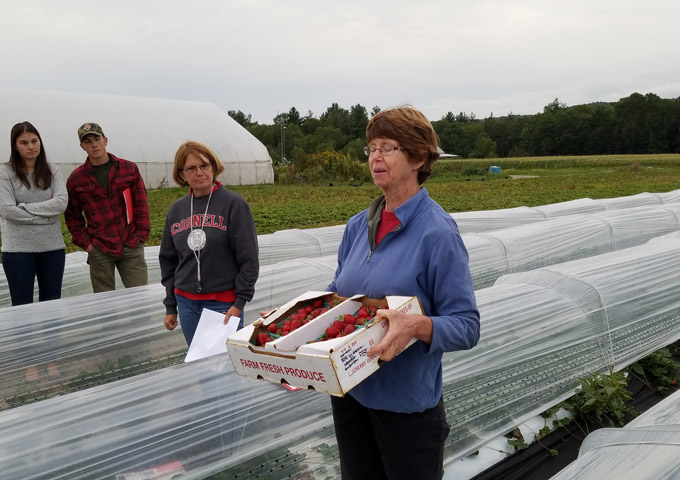At the 2024 Empire State Expo, a variety of experts presented recent findings on berry studies and trials. They’ve kindly shared their presentations with us, which you can access here by clicking on the link beneath each photo. From trends in bramble culture to blueberry pruning, managing anthracnose resistance, and a unique rotating cross-arm trellis system, these presentations represent some of the newest and most innovative techniques in berry growing.
Spotted Wing Drosophila First Trap Catch in Some ENY Counties This Week
Photo by Katja Schulz, CC BY 4.0 <https://creativecommons.org/licenses/by/4.0>, via Wikimedia Commons
By Mike Basedow, CCE-ENYCHP, Eastern New York
Spotted wing drosophila first trap catch is showing up in a handful of ENY counties this week. Counties reporting first catch in our region include Columbia County, Rensselaer county, Saratoga County, Washington County, and Essex County. Cherries and peaches will be at risk once they’ve begun to blush or soften. Spotted wing can be managed using a combination of cultural and chemical practices. You will need to be diligent.
Excellent sanitation will reduce SWD populations. Fruit should be harvested frequently and completely to prevent the buildup of ripe and over-ripe fruit. Unmarketable fruit should be removed from the field and either frozen, “baked” in clear plastic bags placed in the sun, or disposed of in bags off-site. This will kill larvae, remove them from your crop, and prevent them from emerging as adults.
Cool fruit immediately. Chilling immediately after harvest to 32° – 34° F will slow or stop the development of larvae and eggs in the fruit. U-Pick customers should be encouraged to refrigerate fruit immediately to maintain fruit quality at home.
An open canopy will make the environment less favorable. Prune to maintain an open canopy, increase sunlight and reduce humidity. This will make plantings less attractive to SWD and will improve spray coverage. Repair leaking drip lines and avoid overhead irrigation when possible. Allow the ground to dry before irrigating.
Insecticide sprays will kill SWD adults and thereby reduce egg laying. Insecticide treatments should begin at first SWD trap catch when highly susceptible fruit crops begin ripening. Insecticides should be re-applied at least every seven days and more often in the event of rain. Choose the most effective insecticides with pre-harvest intervals that work for your picking schedule. Rotate insecticides according to their modes of action. The spray guide quick sheets for SWD can be found here.
You can also learn more about regional monitoring efforts for spotted wing, as well as tips for management of this pest, on the NYS IPM SWD webpage.
Registration Open for Employee Development and Training Course
Submitted by Cornell University College of Agriculture and Life Sciences
Cornell Agricultural Workforce Development has opened registration for a new online course in the Supervisory Leadership Certificate Program. Offered for the first time, “Employee Development and Training” course materials release and registration closes on March 3, 2023. Live weekly Zoom sessions will be held 3 to 4 PM EDT each Thursday from March 9 through April 13. Continuing education credits are offered. Course cost is $275 and spaces are limited.
Find information and registration for the Agricultural Supervisory Leadership certificate courses here.
“I hope participants will gain practical tools that they can put in their supervisory skills toolbox. They can pull these tools out and use them to build a great workplace and solve problems. Ultimately, we want farm managers to be just as confident about their ability to lead people as they are about their ability to manage farm production,” said Dr. Richard Stup, Agricultural Workforce Development Specialist.
Employee Development and Training is the course you’ve been waiting for! Identify training needs. Understand learning styles. Design and plan learning experiences that accommodate learner needs. Develop effective training skills and techniques. Evaluate learning results and training effectiveness.
“We’re always looking for ways to improve labor management and leadership skills and we encourage our employees to take courses too,” said Bob DiCarlo, FaBa Farms, who took the Managing Performance course, and his employee took Organizing Work for High Quality Results. “We’re focused on continuous improvement. One of the big pluses has been getting to have time to learn from people not in the same agriculture industry and to talk through real-life situations. The breakout Zoom sessions were worthwhile. It was helpful for me to talk through situations and for our employee too. It's easy to say I’m busy but pick the course that would be of most interest. When you push your comfort zone, it returns the most. We’re continuing to see the importance of stepping away from daily tasks on the farm to see the bigger picture.”
The Agricultural Supervisory Leadership Program includes a series of courses that help farm supervisors and managers learn and apply human resource management practices and leadership skills that foster rewarding workplaces and drive business results. Confident managers who thoughtfully apply leadership and management skills improve employee performance, develop teams, reduce employee turnover, and increase employee engagement. The six courses within the certificate series offer extensive practice and engagement activities to build confidence and skill sets.
Who should attend?
This course, and the whole certificate program, is appropriate for both new and experienced farm supervisors and managers, and those preparing to become supervisors. All participants learn leadership concepts and practice skills that improve their ability to build a positive workplace and get results through leading others.
How to attend?
The course is taught online, but you can still actively engage with other learners. Watch prerecorded presentations on your own schedule, and engage with classmates and instructors during weekly, live discussion sessions. Participation in the live sessions is highly encouraged and provides a valued opportunity for peer-to-peer learning and networking. Continuing education credits are offered.
Course instructors include:
Richard Stup, Cornell Agricultural Workforce Development Specialist
Elizabeth Higgins, Ag Business Management/Production Economics Extension Specialist with the Eastern New York Commercial Horticulture team
Libby Eiholzer, Bilingual Dairy Specialist, Cargill
Bob Milligan, Cornell University Professor Emeritus
Kaitlyn Lutz, Bilingual Dairy Management Specialist
Jay Canzonier, Cornell Agricultural Workforce Development Extension Support Specialist
Direct questions to Rachel McCarthy, Agricultural Supervisory Leadership Coordinator, at rachel.mccarthy@cornell.edu.
Courses in the Supervisory Leadership certificate program can be taken in any order and include:
Transitioning to Supervisor: Develop essential communication skills and manage conflict. Lead a multi-cultural team. Build an effective workplace culture.
Organizing Work for High Quality Results: Create an efficient and high-performing workplace. Develop clear expectations and standard operating procedures. Delegate effectively. Diagnose and correct performance problems.
Managing Performance: Understand motivation. Harness the power of performance feedback and coaching. Build clear and effective workplace communications. Set safety expectations. Conduct effective performance improvements.
Ethics and Employment Regulations for Supervisors: Implement responsible and ethical labor practices and understand why this matters for agriculture. Recognize and prevent sexual harassment. Understand and follow minimum wage and overtime laws. Implement Equal Employment Opportunity laws to prevent discrimination and harassment. Use an employee handbook. Handle employee discipline and termination.
Employee Development and Training: Identify training needs. Understand learning styles. Design and plan learning experiences that accommodate learner needs. Develop effective training skills and techniques. Evaluate learning results and training effectiveness.
Staffing and Organizing Your Team: Develop job descriptions. Learn how to find potential employees, interview and select the right people. Implement new hire documentation, employment authorization, and onboarding: bringing new employees into the business successfully and productively.
USDA Develops Simplified Direct Loan Application
Submitted by the USDA Farm Service Agency
The U.S. Department of Agriculture (USDA) has developed a simplified direct loan application to provide improved customer experience for producers applying for loans from the Farm Service Agency (FSA). The simplified direct loan application enables producers to complete a more streamlined application, reduced from 29 to 13 pages. Producers will also have the option to complete an electronic fillable form or prepare a traditional, paper application for submission to their local FSA farm loan office. The paper and electronic versions of the form will be available starting March 1, 2023.
“USDA is committed to improving our farm loan processes to better serve all of our borrowers,” said FSA Administrator Zach Ducheneaux. “We’re consistently looking for ways to make the application process easier to navigate, so more producers are able to complete it. Our new direct loan application is a critical step forward in our efforts to improve customer service and build equity into not just our programs but also our services.”
Approximately 26,000 producers submit a direct loan application to the FSA annually, but there is a high rate of incomplete or withdrawn applications, due in part to a challenging and lengthy paper-based application process. Coupled with the Loan Assistance Tool released in October 2022, the simplified application will provide all loan applicants access to information regarding the application process and assist them with gathering the correct documents before they begin the process. This new application will help farmers and ranchers submit complete loan applications and reduce the number of incomplete, rejected, or withdrawn applications.
In October 2022, USDA launched the Loan Assistance Tool, an online step-by-step guide that provides materials to help an applicant prepare their farm loan application in one tool. Farmers can access the Loan Assistance Tool by visiting farmers.gov/farm-loan-assistance-tool and clicking the ‘Get Started’ button. The tool is built to run on any modern browser like Chrome, Edge, Firefox, or the Safari browser. A version compatible with mobile devices is expected to be available by the summer. It does not work in Internet Explorer.
The simplified direct loan application and Loan Assistance Tool are the first of multiple farm loan process improvements that will be available to USDA customers on farmers.gov in the future. Other improvements that are anticipated to launch in 2023 include:
An interactive online direct loan application that gives customers a paperless and electronic signature option, along with the ability to attach supporting documents such as tax returns.
An online direct loan repayment feature that relieves borrowers from the necessity of calling, mailing, or visiting a local Service Center to pay a loan installment.
USDA provides access to credit to approximately 115,000 producers who cannot obtain sufficient commercial credit through direct and guaranteed farm loans. With the funds and direction Congress provided in Section 22006 of the Inflation Reduction Act, USDA took action in October 2022 to provide relief to qualifying distressed borrowers while working on making transformational changes to loan servicing so that borrowers are provided the flexibility and opportunities needed to address the inherent risks and unpredictability associated with agricultural operations.
Soon, all direct loan borrowers will receive a letter from USDA describing the circumstances under which additional payments will be made to distressed borrowers and how they can work with their FSA local office to discuss these options. Producers can explore all available options on all FSA loan options at fsa.usda.gov or by contacting their local USDA Service Center.
Take Part in the 2023 CCE ENYCHP Fruit & Vegetable Conference
After three years of virtual programming, the CCE ENYCHP Fruit & Vegetable Conference is back in person in Albany, February 22 and 23. Get ready for two full days of informative sessions, many of which will offer DEC credits, and a trade show. After Wednesday sessions, enjoy light hors d’oeuvres and networking with vendors, conference attendees, and your peers at the attend the Trade Show Social.
Register by February 12 to save money and ensure your room booking at a reduced rate. Click here for more information and to register.
Here’s this year’s agenda:
2023 CCE ENYCHP Fruit & Vegetable Conference
February 22-23, 2023
The Desmond Hotel & Conference Center
660 Albany Shaker Rd., Albany
Tuesday, February 21, 2023: Pre-Conference Produce Safety Grower Training Course, 8:15am-5:00pm
Wednesday, February 22, 2023:
Tree Fruit Sessions, 9:00am–4:00pm
Small Fruit Sessions, 9:00 am-3:30pm
Vegetable Sessions, 9:00 am–4:00pm
Join us after the sessions for our Trade Show Social, held in the Fort Orange Courtyard
Thursday, February 23, 2023
Tree Fruit Session, 8:30am-12:00pm
Vegetable Sessions, 9:00am-3:00pm
Grape Session, 9:00am–12:00pm
Conference costs: Pre-conference Food Safety training is $65/person. Regular conference registration starts at $80/person/day for ENYCHP contributors. Discounts for multiday and multiple attendees from same farm are available. Walk-in registration is $130 per person per day. Register by February 15 for the best rates!
Lodging: Group rate of $149 per night per room at The Desmond. The deadline for this reduced room rate is February 12th.
Free Mental Health First Aid Trainings for Ag Communities of New York State
Did you know that farmers are more likely than the general population to die by suicide?
NY FarmNet is collaborating with county Cornell Cooperative Extension offices this fall to offer free, full day, in person Mental Health First Aid (MHFA) courses. Farmers, agribusiness workers, and anyone who interacts with the agricultural community in New York is encouraged to attend. Trainings run from 8am to 5pm, and lunch will be provided from a local eatery with a one hour break.
Mental Health First Aid teaches you how to identify, understand, and respond to signs of mental health and substance use challenges among adults. You’ll build skills and confidence you need to reach out and provide initial support to those who are struggling. You’ll also learn how to help connect them to appropriate support.
After the course, you will be able to:
• Recognize common signs and symptoms of mental health and substance use challenges.
• Understand how to interact with a person in crisis and connect them with help.
• Use self-care tools and techniques.
The instructors for these courses are part of a recently trained cohort that work within the NY agricultural community. They include representatives from NY FarmNet, Cornell Cooperative Extension, Farm Bureau, Young Farmers Coalition, NY Center for Ag Medicine and Health (NYCAMH), and Black Farmers United NYS.
Scheduled full day MHFA trainings for this fall include:
Tuesday, October 18 in Hudson/Columbia County
Wednesday, October 19 in Cortland/Cortland County
Friday, October 21 in Ithaca/Cornell University/Tompkins County
Tuesday, October 25 in Middletown/Orange County
Wednesday, November 2 in Binghamton/Broome County
Monday, November 7 in Lockport/Niagara County
Tuesday, November 8 in Fonda/Montgomery County
To register, go to www.nyfarmnet.org/trainings. If we don’t yet have a training scheduled in your area, check back soon, or contact NY FarmNet at 1-800-547-3276 or nyfarmnet@cornell.edu.
These free trainings are made possible by funding from the United States Department of Agriculture’s National Institute of Food & Agriculture. They have invested nearly $25 million in addressing farmer behavioral health on a state by state basis as part of the Farm and Stress Assistance Network (FRSAN) through state Departments of Agriculture.
This work is supported by 7 U.S.C. 5936, Section 7522 of FCEA of 2008, Farm and Ranch Stress Assistance Network (FRSAN), Grant No. 2021-70035-35550, from the U.S. Department of Agriculture, National Institute of Food and Agriculture.
FY 2019 H-2B Cap Relief Update
The Federation of Employers and Workers of America (FEWA) has shared this important update.
Last month, the Appropriations Committees filed the conference agreement on the FY 19 Labor-HHS and Department of Defense “minibus” appropriations bill, which includes a continuing resolution (CR) to maintain funding for the Department of Homeland Security (DHS) and other federal Departments through December 7, 2018.
What does this mean for H-2B?
The conference report that was filed would continue the Department of Labor (DOL) H-2B provisions that have been included in past funding bills. No immediate changes to the program.
Cap relief is not included in this “minibus” bill that is expected to be signed into law.
What does this mean for H-2B Cap Relief?
The CR for the DHS though December 7 is important, as it relieves the pressure of a governmental shutdown.
The DHS funding bill passed by the House Appropriations Committee in July would exempt returning workers from the annual H-2B visa cap, along with other adjustments. The Senate Appropriations Committee–passed version of FY 2019 DHS funding bill asks DHS to consider a more equitable annual allocation of the 66,000 visas.
Congress will not take up an FY 2019 funding bill for DHS after the November 7 elections. THIS WILL BE OUR OPPORTUNITY FOR H-2B CAP RELIEF.
What can you do?
After this bill is signed into law, House members will be returning to their home districts to begin campaigning for election day. Meet with your representative at home and stress the importance the H-2B program has on your business and the need for immediate cap relief. View H-2B Cap Relief Talking Points.
After November 7 elections, Congress will return to DC, and within the first week concentrate on electing leadership roles. Once that is complete they will have until December 7 to negotiate the remaining bills to fund the government. THIS WILL BE OUR OPPORTUNITY FOR THE H-2B RETURNING WORKER EXEMPTION.
FEWA and the H-2B Workforce Coalition continue to urge Congress to include the House cap relief language in a final appropriations bill. FEWA’s Jarrod Sharp and Robin Svec will be in Washington, DC, later this month to further advocate for this language.
In addition to continuing to push for Congress to pass H-2B cap relief we will let you know when Congress votes on this legislation.
Farmers' Market Finds with Dale Ila Riggs
This summer, NYSBGA board chair Dale Ila Riggs was interviewed by Albany radio station WEQX about how she got her start in farming and why growing and selling healthy, happy berries has become such an important part of her work. Listen to the interview through the link below.
A Look at Our 2017 Berry Production Workshop
We're sharing our favorite moments from our late-August Berry Production Workshop, sponsored by Cornell University and Cornell CCE. Check out our October newsletter for the full summary of the event, which brought together scientists, growers, and ag professionals from across New York State.
Member Spotlight: Abbott Farms
Member Spotlight: Abbott Farms
Ask most farmers what they grow and sell, and they’ll enumerate a list of fruits and vegetables. Ask Warren Abbott of Abbott Farms, and the answer is “Fun.”
Of course, the farm also sells other products, and lots of them—including strawberries, raspberries, blueberries, sweet cherries, rhubarb, asparagus, sweet corn, pumpkins, Italian prunes, and apples, as well as beef, hard cider, and wine. But what Abbott Farms—located in Baldwinsville and in operation, in the same family, since 1866—focuses on most of all is the customer. “We really sell an experience,” Warren explains, noting that the farm has up to 85 employees seasonally each year, most of them in customer service–related roles.
Prior to 1964, Abbott Farms was a small subsistence dairy. They added grain and potatoes at that time, and a small store for some retail sales by the early ’70s. In 1993, with the addition of a new store, they shifted their focus toward retail, and by 2007 had left the grain market entirely. These days, under the management of their fifth generation of farmers, they sell wholesale only if there’s extra supply. Recently, they added hard cider and wine, to satisfy the customer demand for quality local products and the in-person touch.
Over the years, the Abbotts have found that in order to sell in volume, customers require that the products be grown right on the farm. “Every time we decide to grow an item we sell, we triple sales of that item instantly,” Warren says. “I would have never guessed it would be so dramatic. We would have made that change sooner [if we had known].”
Crop losses from SWD encouraged the Abbotts to walk away from growing fall raspberries and day-neutral strawberries, though Warren says they may restart those crops “if control methods are available and economical.” As a business, Abbott Farms’ bigger challenges have been expanding frequently to maintain income; labor rates and regulation; and finding, training, and keeping good employees in seasonal positions.
For now, they’re focusing on frequent shake-ups to their strategy to maintain consumer interest. “The cidery will take some time to dial in, but it’s the most exciting and promising change since 2007,” Warren says, adding that they’ll be introducing a hard-cider tasting room soon. Besides the many varieties of fruit and sweet ciders available for tasting, they also offer happy-making products like 10 flavors of fudge and more than 20 flavors of ice cream. And they try to emphasize to customers that they select berry varieties for flavor, and pick for flavor and sugar content—not shipping and storage hardiness—to bring audience back week after week.
On-farm events—such as foot races, berry festivals, pancake breakfasts, a weekly festival in the fall, weekly farmers’ markets, and birthday parties—have been a big success. These events keep Abbott Farms top of mind—and tops in word-of-mouth referrals—for customers, as does maintaining a regular e-mail and Facebook, Instagram, and Twitter presence. They also advertise on billboards and in family and leisure guides in season.
Even though Abbott Farms is tech- and marketing-savvy, they still make sure the personal touch comes across in everything they do. Warren says, “We will continue to offer educational, family fun, while picking fruit and relaxing around the farm.” Maybe even for another 150 years.
